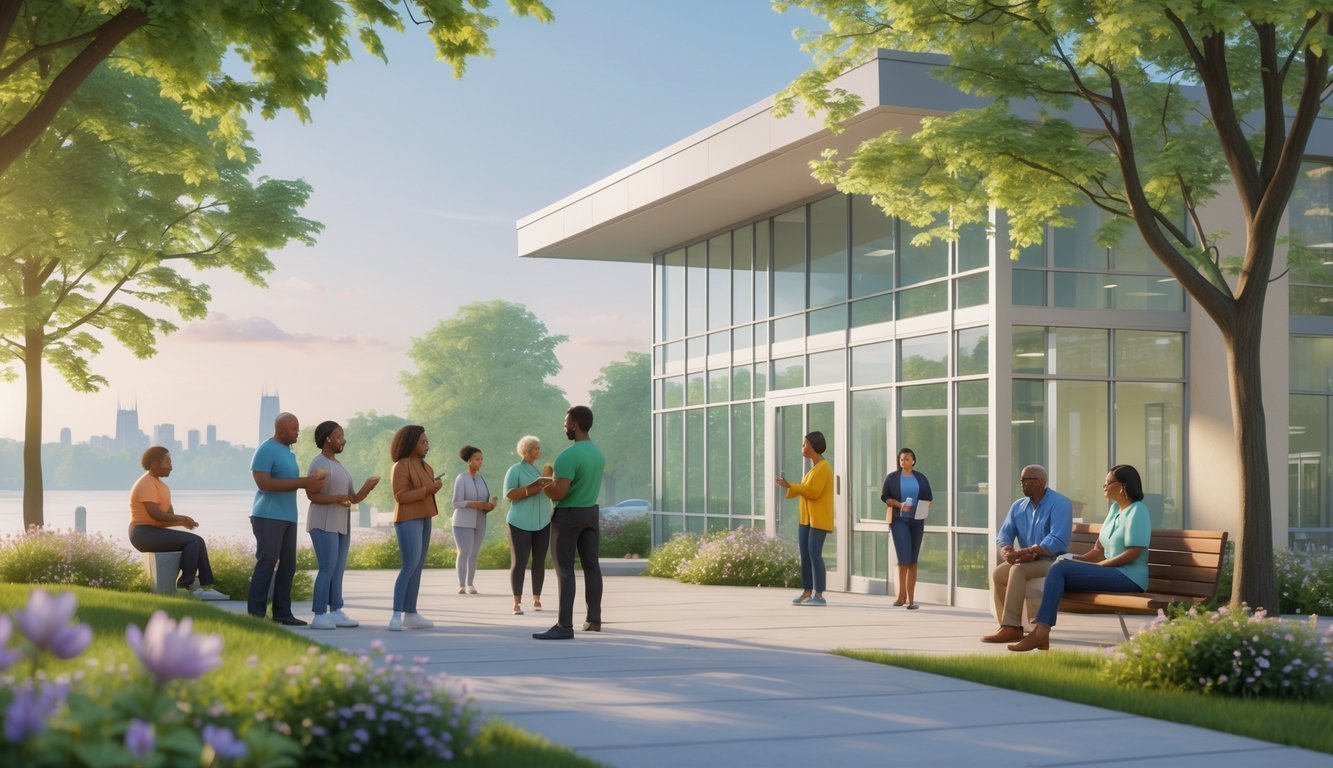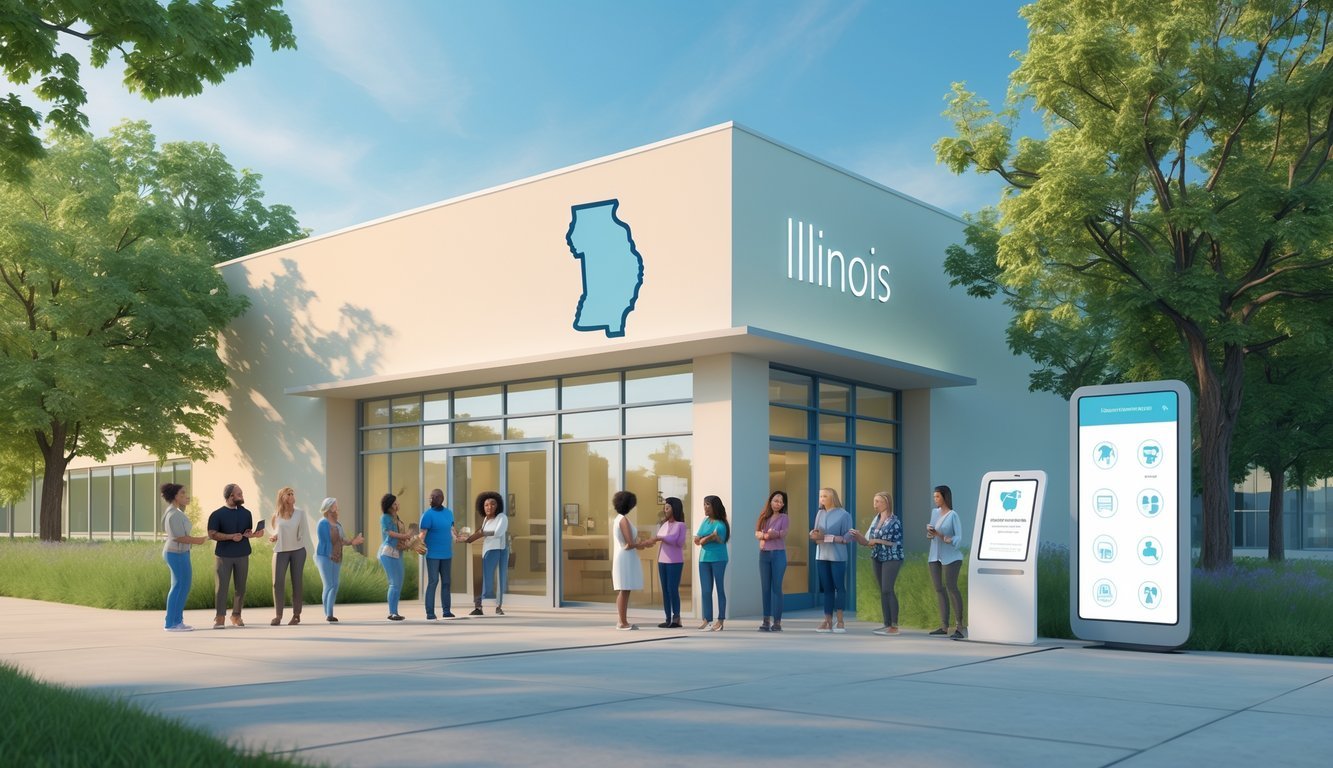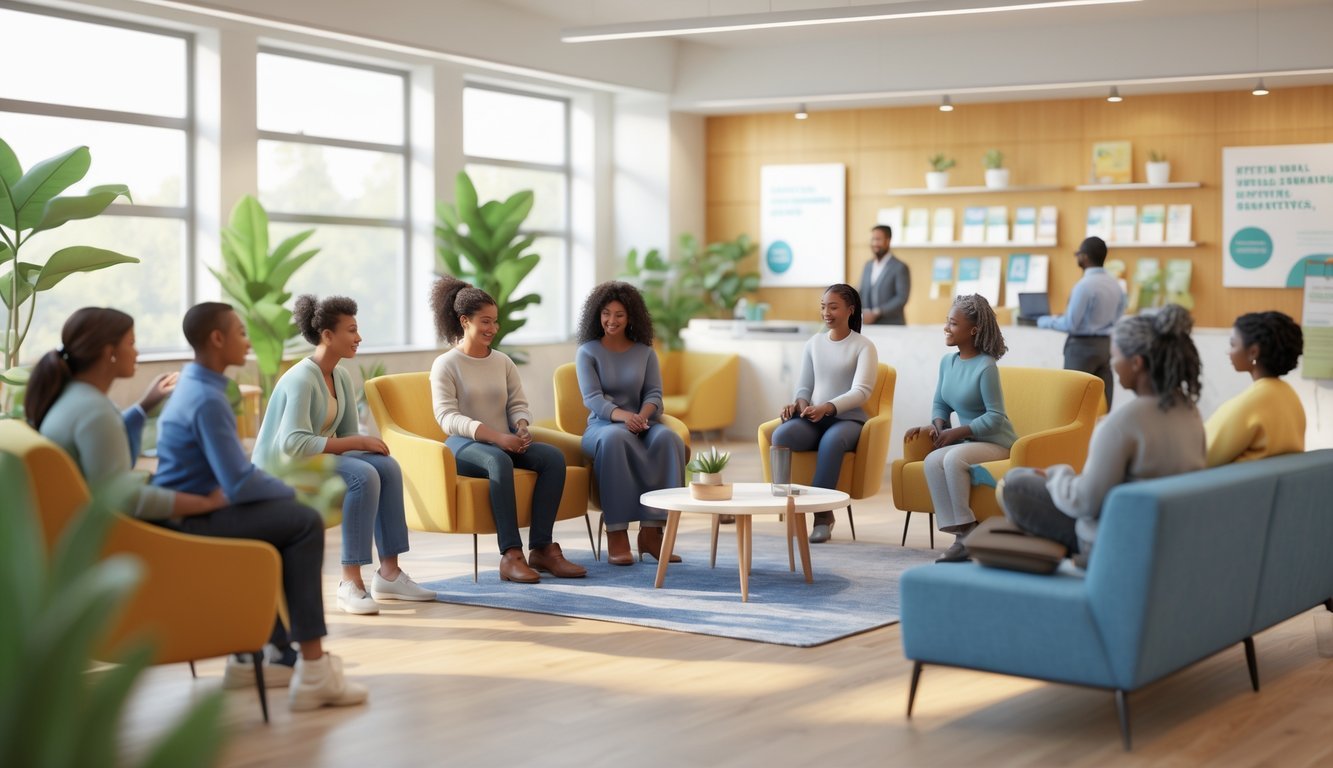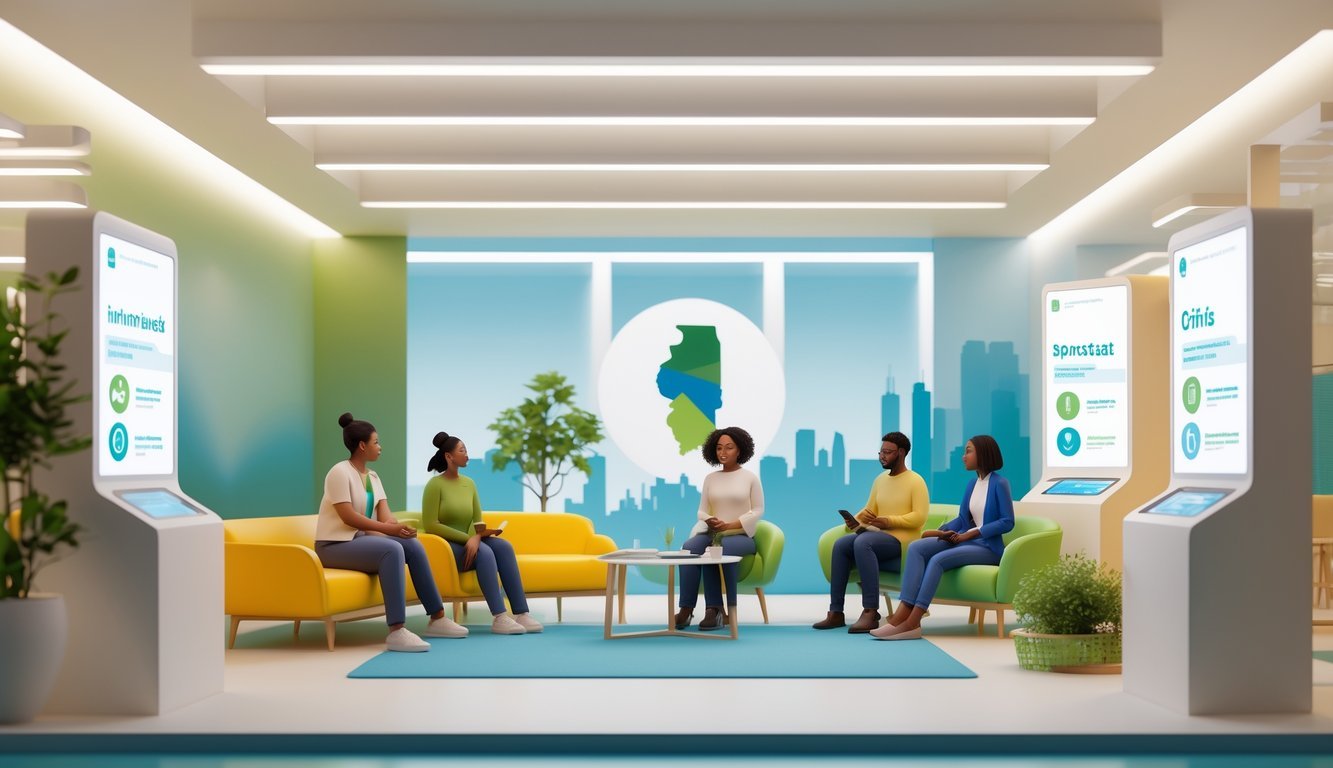PsychNewsDaily Publishers
100 Summit Drive
Burlington, MA, 01803
Telephone: (320) 349-2484
PsychNewsDaily Publishers
100 Summit Drive
Burlington, MA, 01803
Telephone: (320) 349-2484
Illinois offers various mental health services, including counseling, crisis intervention, and specialized care through community health centers, nonprofits, and state programs, accessible without cost.

You shouldn’t have to worry about money to get mental health support. Illinois has plenty of free mental health services through state programs, community groups, and healthcare systems. These options give you access to counseling, crisis help, and specialized care without charging you.
In Illinois, you can get free mental health services through community health centers, university programs, nonprofits, and city-funded initiatives. These places offer everything from one-on-one counseling to emergency crisis intervention. The City of Joliet provides comprehensive mental health care to residents. Centerstone has locations throughout Illinois and offers specialized treatments for mental health and substance use.
If you’re dealing with stress, anxiety, depression, or you need urgent crisis support, it helps to know your options. This guide will show you where to look, how to get started, and which organizations focus on your mental health, no matter your budget.

Illinois has several ways for you to connect with free mental health care. Statewide resources and local programs can help, but knowing the basics makes things less confusing.
211 is a main go-to for finding free mental health services nearby. Just dial 2-1-1 from any phone and you’ll reach trained specialists who’ll connect you with local programs.
They answer calls 24/7, every day. You can ask them to help you find counseling, crisis support, or treatment programs that fit your needs and location.
If you’d rather search online, the 211 website lists mental health providers across Illinois. You’ll find contact info, hours, and eligibility details there.
Many counties also have their own mental health directories. You can usually find free and low-cost options on your county health department’s website.
If you’re in crisis, hotlines can connect you to local teams for same-day appointments or emergency care.
Community mental health centers form the backbone of Illinois’ free mental health care. The state and federal government fund these centers so you can get services even if you can’t pay.
Most centers let you walk in for urgent needs. Crisis walk-in services run Monday through Friday at many spots during business hours.
You don’t usually need a referral. Just call or show up during intake hours to get started.
The City of Joliet offers mental health care at no cost for residents. Their services include stress management, anxiety counseling, depression treatment, and family therapy.
Many centers also run programs for specific mental health needs. You might find depression support groups, anxiety classes, or trauma counseling.
Most free mental health services in Illinois use your income to decide if you qualify. They usually help people and families at or below certain income levels.
During intake, you’ll give basic info like your name, address, phone, and any insurance you have.
When you call for help, have your insurance info ready — things like your company name, policy number, and group number. Many programs bill insurance first, then cover what’s left.
Some programs ask for proof you live in a certain city or county. Bring a utility bill or lease to show your address.
The application is simple and often done over the phone. Staff will ask about your mental health and what you need right now to match you with the right services.
Many centers offer same-day appointments if you’re in crisis. Don’t be shy about saying you need urgent help.

Several organizations in Illinois provide free mental health services. State agencies, local nonprofits, and community groups all play a part.
NAMI Illinois is the state’s largest mental health advocacy group. They offer free support groups, education, and peer counseling across Illinois.
What NAMI Offers:
NAMI has local affiliates in cities like Chicago, Springfield, and Peoria. Each one tailors its services to the local community.
You can find your nearest NAMI chapter on their website. Most hold weekly support groups and monthly seminars for free.
The Illinois Department of Human Services (DHS) runs mental health programs statewide. DHS operates community mental health centers in every part of Illinois.
These centers provide free services if you meet income requirements. They offer counseling, medication management, and crisis support.
What DHS Provides:
You can apply at any DHS mental health center. Staff will check your eligibility and help you get the care you need.
Community organizations fill important gaps in mental health care across Illinois. Centerstone has served southern Illinois since 1957, offering mental health and substance use treatment.
Local initiatives often focus on specific groups or neighborhoods. Many use sliding-scale fees or offer services for free if you qualify.
Typical Community Services:
You’ll also find religious groups, community centers, and volunteers hosting free mental health support meetings. These grassroots efforts give people valuable support and help reduce isolation.

Illinois has special mental health programs for different populations and emergencies. These include 24/7 crisis hotlines, youth programs, culturally responsive care, and rural resources.
The 988 Suicide & Crisis Lifeline gives you free, confidential support any time. Call 988 or chat online if you’re having suicidal thoughts, a mental health crisis, or just need someone to talk to.
If you’d rather text, the Crisis Text Line is there for you. Text HOME to 741741 to reach a trained counselor right away.
Local Crisis Numbers:
Illinois runs Community Triage Centers where you can walk in for crisis services. They’ll do a mental health evaluation and connect you with ongoing care.
NAMI Illinois also runs support groups and educational programs for anyone with a mental health condition and their families.
The UIC Specialized Care for Children program connects families to mental health services for kids with special healthcare needs. They help coordinate care and offer family support.
A lot of Illinois school districts have mental health services right in schools. These programs offer counseling, crisis help, and behavioral support.
Services for Kids and Families:
The Illinois Department of Children and Family Services provides trauma-informed care for children in the child welfare system. Their services address the needs of youth who have experienced abuse or neglect.
Illinois funds mental health programs for specific cultural communities. These services offer therapy in different languages and understand cultural factors that matter.
Available Services:
LGBTQ+ affirming mental health services are available statewide. The Center on Halsted in Chicago, for example, offers counseling for LGBTQ+ people and families.
Many providers train in LGBTQ+ cultural competency. Don’t hesitate to ask therapists about their experience with LGBTQ+ clients and how they approach gender-affirming care.
Rural Illinois has its own mental health challenges, like fewer providers and long travel times. Telehealth helps by letting you talk to a therapist over video.
Farm families can get specialized counseling through the Farm Family Resource Initiative. This program understands the pressures of farm life and seasonal stress.
Rural Resources:
Centerstone runs clinics in rural towns. They offer mental health and substance use treatment for all ages.
If you live in a rural area, call 211 for help finding services. This free call connects you to local resources and helps you sort through your choices.
Trying to get mental health care can feel overwhelming. But knowing how to access services and speak up for yourself can make the process less stressful.
A lot of people have trouble getting mental health services even when they want help. Less than half of children referred to mental health services actually get them, often because the system is confusing.
Insurance issues are a big barrier. Call your insurance company first to check your mental health benefits. Ask about copays, deductibles, and which providers they cover.
Wait times can be long. Try calling several providers to see who can get you in soonest. Some clinics have cancellation lists for earlier slots.
Getting there can be tough if you don’t drive or live near a provider. Look for locations close to public transit, or ask about telehealth. Some centers even help with transportation.
Stigma still keeps many people from seeking help. Remember, mental health conditions are medical — you deserve care, and your privacy is protected.
Standing up for yourself helps you get the care you need. A little preparation goes a long way.
Bring a list of your symptoms, medications, and questions to appointments. Jot down important info during visits. If you want, bring a friend or family member for support.
Ask questions about your treatment. If something doesn’t make sense, ask for a plain explanation. Don’t leave confused about what’s next.
Know your rights as a patient. You can ask for a second opinion, request different medications, or switch providers if you’re not happy.
Keep records of your treatment, appointments, and insurance info. This makes it easier for new providers to help you.
Speak up if treatment isn’t working. Mental health care often takes some tweaking to get right.
Illinois has a bunch of free and low-cost mental health services outside of traditional therapy. These can really help if your insurance won’t cover enough or you need help right away.
Community mental health centers figure out costs based on what you can actually pay. The City of Joliet offers cost-free mental health care and counseling services like stress management, anxiety and depression counseling, and family therapy.
Walk-in crisis centers let you get help right away, no appointment needed. Crisis walk-in services are available Monday through Friday at several locations for those facing tough mental health issues.
Peer support programs match you with people who really get what you’re going through. The CRSS Program supports students with lived experience of mental health recovery at certain schools.
College counseling services give students free support. University mental health services include personal counseling, group therapy, and peer support for different mental health needs.
24-hour crisis hotlines let you talk to someone right away, any time, for free. These hotlines are there for emergencies when you can’t find help anywhere else.